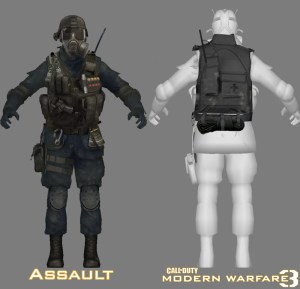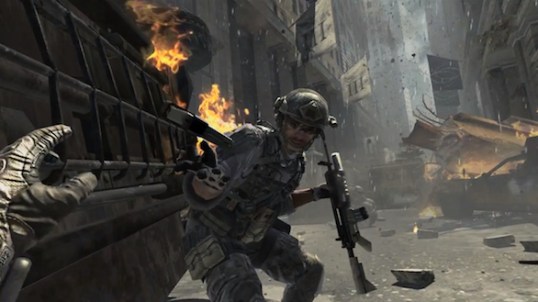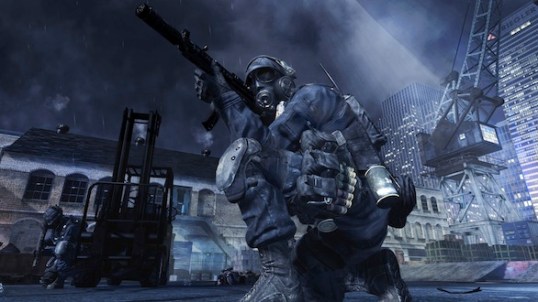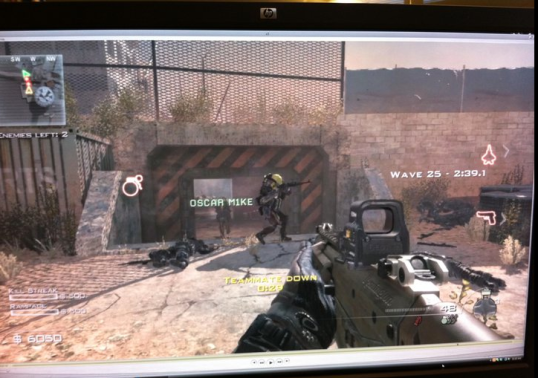How important is Modern Warfare 3 to Activision? It’s being co-developed by three separate studios: Infinity Ward (still going after the exit of the studio’s founders), Sledgehammer Games and Raven Software. Glen Schofield comes to Activision from EA, where he worked on the first Dead Space and Dante’s Inferno.
Contrary to what’s been reported elsewhere, the studios are working in full partnership, with each having hands in single-player and multiplayer portions of the game. After watching the "Black Tuesday" level and playing Spec Ops Survival, I sat down with Glen Schofield of Sledgehammer and Creative Strategist Robert Bowling from Infinity Ward to talk about the development process and the ideas going into the high stakes sequel.
Robert, you’ve been at Infinity Ward since Call of Duty 4, but Glen’s only just come on board to the franchise with this game. That makes you a Call of Duty virgin, then.
Schofield: [Laughs] Well, I was. I’m not anymore.
So, I don’t have to tell you guys that the stakes are super-high this year. You guys have a competitor that’s gunning for you in a way, I think, that you hadn’t had before. There’s been whispers that the fan base is a little bit tired of what you guys may have to offer. How would you answer that? What’s new? Why should someone who has been playing COD year in and year out, show up?
Bowling: Right. Well, Modern Warfare 3 is all about bringing an experience for every type of player. What that answer is depends on the type of player you are, because it’s very unique for each mode. From a story standpoint, this is a huge payoff for the guys who have been with us since Call of Duty 4 when we introduced the characters and have seen the momentum that has built up with this conflict.
From a gameplay standpoint, we’re doing something we’ve never done before. We’re moving into the heart of major cities. We’re taking the epic, cinematic set-piece moments that you love, that immersion that you love from Call of Duty, and you’re seeing it in places you’d never expect.
You’re seeing things happen in these locations that feel safe and familiar, and to see that is one thing, but to be interactive and be a part of that is completely different. And that’s just on the single player side. Spec Ops is their dedicated co-op mode–which you can play solo as well–but what we’re doing really well is we’re blurring the line between the experiences. We’re taking the stuff that’s fantastic in multiplayer and we’re bringing it in to co-op. And we’re taking moments from single-player and aspects that you love there and we’re bringing it into co-op.
(MORE: ‘Battlefield 3’ Producer: ‘Controversy Is Not a Mature Way to Sell a Game’)
A lot of new players continually complain about not being able to enjoy the multiplayer…
Bowling: What we’ve done this year really allows you to get experiences that the more casual player doesn’t get from multiplayer. Even if they are playing multiplayer, it allows you to have experiences that you may never see as a casual player, but now you get them in a place that’s more fun and comfortable for your skill set.
So it’s all about opening it up to allow you to have fun the way you want to have fun. And that’s the biggest challenge with having an audience of 30 million people: 30 million people have a wide spectrum of taste and a wide definition of what fun is. Our job is to give you a platform to have fun the way you want without hindering someone else.
article continues on next page…
Schofield: It’s hard to elaborate on much of what Rob just said, but the co-op of Spec Ops is fantastic. We’ve added a brand new mode, Survival. We still have the great Mission mode. But, personally, a lot of us also have a blast playing it alone.
It’s great playing as a co-op but it’s also made to be played alone as well. If I want to play it alone, I got this other thing that I can go out and I can upgrade, and I can play and a lot of us are having a blast with that as well. So there’s a lot of single player experiences as well.
Robert, one of the things you mentioned was locations, and obviously a chunk of the game is set in New York. Not only is it set in New York, but you’ve got buildings crumbling in downtown Manhattan in a game that comes out 10 years after 9/11. What reservations did the guys at Infinity Ward have about approaching these sequences? Did you have anything that maybe gave you pause or something that you tried to be sensitive around? That stuff might be an issue when the game comes out.
Bowling: Yeah, I think this is a great answer for Glen to take, because Sledgehammer had a huge role in shaping this level as it played out. Before I hand it off, one thing I’ll say is it’s always a key thing for us is to be as authentic as possible in terms of what we’re showing, but Call of Duty takes place in a very unique universe that is outside of our own.
And what sets it apart more than anything is the fact that this is a full-blown war. We’re fighting the traditional Russian military and navy. This is an invasion of the U.S. that has just escalated in New York as well other major cities. And the team has put a lot of work into making sure that we’re delivering that war experience.
(MORE: Why the Cuban Government Is Speaking Out Against "Call of Duty: Black Ops")
Schofield: Yeah, I’m from this area and I’ve lived downtown, and have friends that have been touched by that tragedy, with people who have died. We went into it making sure that we had a healthy dose of respect for what happened. And we in every way possible did not try and tread on that.
I think what Robert is saying is that we’re not in the real world; we’ve made up our story. So, in our story, we don’t have to talk about Osama bin Laden. We don’t have to talk about that sort of thing, and we don’t. I think that we do have respect for what went on. Don’t dive into this with trying to make a controversy out of it.
It’s also the same way that we have a real higher respect for the people in the military. You don’t go into going, “Let’s do something controversial.” Something may have to happen out of it…
But you’re saying it comes from wanting to scale-up the experience.
Schofield: Absolutely. It’s in the story. The story started in Washington and the Russians, they’re not going to go to Pittsburgh next with all due respect.
Right. New York makes for a big target. One of the things I noticed in the "Black Tuesday" level is that you’re playing in New York City, which is a densely populated urban center, but there’s no civilians around. That seemed to me like one of the decisions you guys must have made. Was the thinking that it’s one thing to put war in a realistic setting, it’s another thing to actually put people in danger?
Bowling: Well, what you’ll notice as you’re playing throughout is the war is ranging very differently in each location. So, the war in New York has been going on for a while. It’s very different than how you’re fighting in the streets of London.
article continues on next page…
I saw that in "Mind the Gap," where the Tube stations still have people in them.
Bowling: Yeah. So the military has control of New York currently, especially in the parts that you’re fighting in, where London is different. It’s still very much a highly populated city. It hasn’t escalated to the scale that it has in America yet. And that impacts the gameplay; that impacts the rules of engagement and how you approach each mission, and the immersion. So, I wouldn’t say it’s a one glove fits all sort of deal.
Schofield: And if you noticed, there’s details in both the Manhattan level and in the "Hunter Killer" level in which you’ll see signs, it had said, “evacuate.”
I did see that roadwork sign in "Black Tuesday"…
Schofield: So, the idea there is that there was enough time to evacuate the different areas but we make a point to show some devastation with the Holland Tunnel being flooded, too. What we wanted to get in there is that people were escaping. They were getting away or leaving.
So you’re embedding story inside the environment.
Schofield: Yeah, if you watch that movie Battle: Los Angeles, there’s parts of that where the streets are completely empty. They were able to get some of the people out.
 So, let’s talk about tech. You guys haven’t talked very much about the engine yet or anything like that. The game looks great, but I feel like you’ve come under some criticism that it also looks too familiar—the bones of what has come before are still very apparent.
So, let’s talk about tech. You guys haven’t talked very much about the engine yet or anything like that. The game looks great, but I feel like you’ve come under some criticism that it also looks too familiar—the bones of what has come before are still very apparent.
Are you guys ready to talk about that? What’s powering it? What are the changes? I saw incredible particle effects at the beginning of the Manhattan level where the glass from the building is raining down on you. And that seemed to be of a scale that the previous games hadn’t been able to achieve. Can you guys talk about the engine at all?
Schofield: There’s a ton of verticality to show now. You look at the other levels and we’re just as big in footprint, but now we’re tall as well.
Bowling: We’re always expanding on the technology of the previous game. We never just recycle an engine we used before; we’re always building on top of it. The key difference and the key design philosophy that we keep is we never just write code to write code.
We’re always building code for a specific reason that is tied to gameplay, that is tied to solving a problem from a previous game. In Modern Warfare 3, our focus was on maintaining that core integrity of high-speed, 60 frames-per-second gameplay, in addition to, like Glen said, blowing it out in terms of scale. Because the urban environments that we’re fighting in now are completely different from what you’ve seen. They’re denser. They’re more populated. The scope of them is so much larger.
article continues on next page…
So, to get that in addition to those huge moments that you expect, and maintain that 60 frames per second–which sells that smooth gunplay, that smooth control–I mean, that takes a lot of work. It’s work on the back-end of upgrading your streaming tech across all capacities, not only texture streaming, but audio streaming, too.
A lot of some of the minor details that the hardcore guys will appreciate, is adding situational awareness to audio and visuals and stuff like that.
Schofield: We’re putting out a lot of information–I don’t even know how much more data into a level than we were before–but to upgrade and get that kind of graphical fidelity and still have levels that are twice as big, took a ton of heavy lifting.
Some things that people don’t naturally see, but that go right to the gameplay, is in creating a whole new set of coding tools. And people go, “Well, how does that help?” It means we build faster now. We can build and iterate faster. And by having all those tools now that just let us build, we can go, "OK, that’s not good enough. OK, we built it. We iterate. We build it. Break it down. We iterate again." We are able to get almost twice as many iterations in the same amount of time.
People think we get all these questions about the competition, but the truth is that everyday that I go to work, I’m just thinking about this one game. I’m thinking about how do we make it better, and I could say that about everybody down there making the game. The only time I think about the competition is when someone points it out. Because you’re focused.
And what’s that focus on?
Bowling: From a tech standpoint, it all comes back down to the gameplay. At the end of the day, that’s our core philosophy. Will the player notice an increased benefit in playing the game and having fun? And if the answer is no, then it’s a feature that’s not worth focusing on.
Schofield: And obviously, audio is huge. Obviously getting more into the levels is huge when it all comes down. So there were three major areas.
(MORE: Black Ops Designer: "Certain People Will Never Love Multiplayer")
You talk about building and this game represents a co-development scenario with Raven, Sledgehammer and Infinity Ward working on single-player and Spec Ops.
Bowling: It’s co-development but across the board.
Across the board. So you guys have fingers in multiplayer as well?
Bowling: Yeah, it’s across the board.
So, how does that work? Are you guys just like batting builds of the game back and forth?
Bowling: We build from the same tree. So we use the same tree. We’re all checking into the same game in everything we do. We have always worked as very flat organization as Infinity Ward on the previous Call of Duty; it’s always been very much a group effort.
So, the biggest challenge at the beginning was finding out logistically how do you introduce an entirely new team into that system? And once you figure out the logistics and they’re in the system, it’s all about just working together and building-up.
The best man for the job is the best man for the job. The best idea will always come to the top, regardless of where it’s sourced from. Then it’s all about playing to each other’s strengths and weaknesses. They [at Sledgehammer] have fucking geo-builders that are amazing and will build out a level and then go, “The lighting guys [at Infinity Ward] can come in and do great things with that environment.” It’s playing off each other’s strength and weaknesses like that, is what sells it.
article continues on next page…
Glenn, you’re relatively new in the organization. What was the biggest learning curve you had to master going into Modern Warfare 3 specifically?
Schofield: Good question. Look, I have made a lot of games where they’d been licensed products before. And I made a lot of my own IP. This is somewhere in between. Because I get a heck of a lot of say in the game, but we still know that they created it. So, we are right there with them now in story when in creating the game and in creating the big moments, but on the other hand, we’re making sure that our art style fits.
The way that they go after quality, their look, their feel. They had a set of pillars that we needed to follow. So we knew that. It wasn’t any misconception.
Actually, the first couple of months we were still struggling to kind of get our legs because we had to learn the engine. And at the same time, we were learning to work with a new group of people in a new company, and we’re building our company, and that was the toughest time. Can we live up to it?
Sure.
Schofield: What we did was just go back and forth between locations. They would send people up. We would send our guys down there. And both teams had some of the best developers in the world and really smart people and passionate. So after four or five months, I started to feel really good about it. Feeling like, “Yeah, we’re part of it.”
Up to speed.
Schofield: Up to speed.
And you can keep up with them.
Schofield: Yes, yes. And I actually think that the two teams had pushed each other. In the beginning it was a healthy competition and now it’s more like…
Mutual respect.
Schofield: Absolutely. And we push each other that way.
So, platform specific question: There was a lot of outrage last year about hacking on the PS3 and people kind of feeling like the experience there was essentially broken. I know it wasn’t your game, in that Treyarch developed it. But do you guys learn any lessons from the Black Ops PS3 experience and the ways that some of the players were complaining about it?
Bowling: Well, the reality is that there is no platform or game that is not vulnerable to hacking in the world we live in now. So, we look at that as a whole, in terms of, "clearly there needs to be measures taken to prevent and preserve the gameplay experience for our user base. Especially 30 million people, that’s huge expectations of what they want from their game.
(MORE: Violent Video Games: The Top 8 Big Money Franchises)
So, definitely, by far, going into Modern Warfare 3, coming out of Modern Warfare 2, we started focusing on the infrastructure that we could build up on the back-end to make sure that we’re on top and addressing anything that arises. And that’s from a post-launch support in terms of exploits, but even more importantly, going back to our code and looking at, “OK, let’s trim the fat that could lead to loopholes or security exploits."
In addition to building that infrastructure that allows us to have more control to deal with that as it may arise, to making sure that we’re locking down the system and nailing everything to the floor. Something that you didn’t have to worry about in pre-Modern Warfare 2 days when console encryption was all you needed. No longer can you rely on console encryption. But we have to do a lot of work and have done a lot of work for Modern Warfare 3 to make sure that we’re locking our doors and not just relying on them to lock theirs.
That’s a fair statement.
Schofield: And then you’ve got all their knowledge from the past, and their engineers coming at it from, “OK, this is what we’ve learned.” And our guys who have come at it from working on other online games. So now you’ve got two teams of engineers looking at it. And I think we’re quite aware of the situation.
So you talk about the back-end. I know you guys probably won’t be talking about this in-depth until Call of Duty XP, but what about the integration of Elite? For example, Spec Ops co-op, is it going to feed into a leap the same way that the multiplayer would. You’re smirking, Robert? Why?
Bowling: We’re not talking how Spec Ops will tie into Elite. What I can say is Elite from the ground up has been built for Modern Warfare 3, and we’re integrating it in a lot of really cool ways that I’m excited to talk about. But I’m smirking just because I knew I was going to shoot you down when you were done.
Hey, it happens. This is more of like an observation of mine than an actual question, if this ties up the trilogy of like Soap, Price, that whole branch of the Modern Warfare trilogy, and this is literally blowing things out to the level of a World War. Where do you go from here? I’m not asking about future iterations. How do you surpass this? Or is this the equivalent of dropping the mic?
Bowling: [laughs] That’s a good question. We never look at it as a trilogy. We look at it as this is definitely a payoff in the terms of the conflict that you’ve seen start, and definitely a payoff for the characters that you’ve been seeing rise through the ranks.
I mean you started this as Soap MacTavish playing as him, as a soldier on the ground. Then you see him rise to the ranks to captain of a task force. So this is a payoff in that sense. But I would never say that it is the end of a trilogy by any means.
So it’s just the latest chapter.
Bowling: Yes. And I will leave it at that. [Laughs.]




